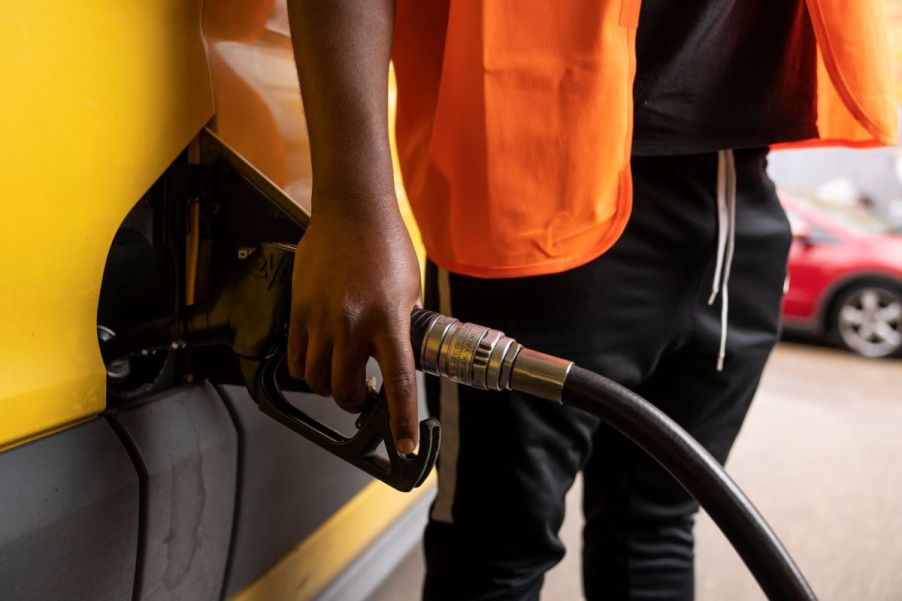
Can a Full Gas Tank Make Your Car Explode in the Summer?
Summer is supposed to be a time of carefree fun—apart from rising gas prices, a continuing pandemic, and supply chain shortages, of course. But there’s one concern that plagues a few drivers every year: the worry over whether a gas tank can explode in high heat during the summer. With reports of record heat sweeping the nation and road trips on people’s minds, we wanted to tackle this story.
Can a gas tank explode due to heat?

“A common rumor holds that a car bearing a full tank of gas on an exceptionally hot day may explode due to increased pressure and heat.”
Can gasoline combust in a hot car? According to Snopes, rumors have swirled on the internet since at least 2011 claiming that filling a gas tank to capacity could pose a major risk of exploding during hot weather because of the liquid expanding. You may remember a story from the 90s about exploding Chevy gas tanks.
Fortunately, per Snopes—a leading buster of myths—the rumor is “complete hogwash.” Gasoline cannot catch fire by itself, that is, without ignition from a spark, until its temperature reaches almost 500 degrees Fahrenheit. That’s far and above any temperature that gas could reach, even in a car parked in the sun for long hours.
Hand sanitizer is more likely to explode in a car than gasoline due to heat, so you can set your mind at ease on this point.
Will my car explode if I overfill the gas tank?
This is another claim in a long line of gas tank myths. As the story goes, overfilling a car’s gas tank can lead to an explosion due to unsafe levels of pressure. However, there’s no truth to this rumor, either. Snopes explains:
“Since 1971, the U.S. Environmental Protection Agency (EPA) has required that all internal combustion engine cars include evaporative emission control (or EVAP) systems. This mechanism collects excess fuel vented from a tank (to maintain even pressure) and, when conditions are correct, returns it to the tank.
Prior to the adoption of these regulations, many gas tanks simply relied upon vented gas caps, leading to the occasional release of liquid gas onto the ground or the emission of volatile chemicals into the atmosphere. A significant build-up of pressure would still not occur in such older vehicles, however.”
So, while there’s no reason to top off your car’s gas tank, and it’s actually recommended that you don’t, overfilling your gas tank will not cause it to explode.
What can cause a car gas tank to explode?
Is it possible for a gas tank to explode? If you’ve ever watched an action movie, you’ve probably seen someone blow up a car by shooting the gas tank. However, this is another false claim. A car’s gas tank wouldn’t explode simply by being punctured by a bullet, because the conditions wouldn’t be right for an explosion.
There have, however, been situations where problems with gas tanks have led to an explosion. But, it’s not because of the gas tank itself. More often, fires and explosions are caused by a leak in the gas tank or fuel line where the fluid comes in contact with some form of ignition or spark.
Be sure to avoid any problems with your car. Here’s how to tell if your gas tank has been tampered with.
Tips for filling your gas tank in hot weather

Since you won’t need to worry about any hot-weather explosions from your gas tank, there are some great gasoline cheats every car owner should know, regardless of the temperature!
- Fill up your gas tank at night to save a few pennies per gallon
- Fill up mid-week—Wednesdays are best
- Take advantage of the best fuel rewards programs
- Explore gas savings from local grocery stores
- Use a high-quality fuel cleaner
- Skip the pumps if they’ve been recently filled
- Use a gas app for convenience and savings
- Buy name-brand, enhanced fuel if you can
- Never drive on empty
- Regular fuel can be as effective as premium


